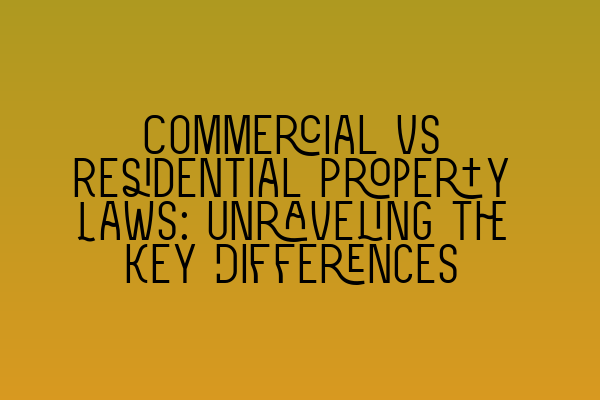Commercial vs Residential Property Laws: Unraveling the Key Differences
When it comes to property laws, there are significant differences between commercial and residential properties. These differences dictate various rights, responsibilities, and obligations for property owners, tenants, and even solicitors who deal with property law cases. In this article, we will explore the key distinctions between commercial and residential property laws, shedding light on important aspects that every property owner or tenant should be aware of.
Before we delve into the differences, let’s first establish a basic understanding of what commercial and residential properties entail. Commercial properties are buildings or spaces that are used for business purposes, such as retail stores, office buildings, industrial warehouses, and restaurants. On the other hand, residential properties are primarily used for housing, including single-family homes, apartments, condominiums, and townhouses.
1. Understanding Contractual Capacity: Rights and Limitations
Ownership and Tenancy: One of the primary differences between commercial and residential properties lies in ownership and tenancy arrangements. In commercial properties, the ownership is often held by a business entity or an individual for the purpose of generating income. The leases for commercial properties are typically long-term, lasting several years, and are subject to negotiation between the landlord and tenant. Moreover, commercial leases are structured differently, often including provisions for rent escalations, maintenance responsibilities, and the possibility of alterations to the premises.
On the other hand, residential properties are primarily owned by individuals or families for personal use. Residential leases are generally shorter in duration, usually spanning one year or less. These leases may have less flexibility in negotiation, as they are subject to various landlord-tenant laws that protect the rights and interests of residential tenants. Additionally, residential leases often have specific regulations regarding security deposits, rent increases, and termination notices.
2. Interactive SQE Mock Tests for Contract Law: Test Your Knowledge
Legal Protections: The level of legal protection offered to tenants and occupants also differs significantly between commercial and residential properties. Residential tenants enjoy certain safeguards under landlord-tenant laws, which are put in place to ensure fair treatment, habitable living conditions, and protection against unjust eviction or termination of lease without proper notice. These laws vary across jurisdictions, but they generally cover aspects such as security of tenure, rent control, health and safety standards, and repairs and maintenance.
In contrast, commercial tenants have fewer legal protections, as the relationship between the landlord and tenant is considered more business-oriented. Commercial leases are typically governed by the principles of contract law, and the terms and conditions outlined in the lease agreement often dictate the rights and obligations of both parties. It is crucial for commercial tenants to thoroughly review and negotiate lease terms to protect their interests in areas such as rent, maintenance, insurance, and dispute resolution.
3. Join Our SQE Contract Law Webinars: Expert Insights and Guidance
Use and Purpose: Another fundamental difference between commercial and residential properties lies in their use and purpose. Commercial properties are explicitly designed and zoned for business activities, catering to the needs of various industries and sectors. These properties may need to comply with specific regulatory requirements, such as obtaining permits or licenses for certain activities, adhering to zoning restrictions, and ensuring compliance with health and safety regulations.
Residential properties, on the other hand, are intended for personal dwelling and habitation. They must meet certain standards to ensure the well-being and comfort of the residents. However, residential properties generally have fewer restrictions compared to commercial properties, as they do not involve the same level of public activities or potential risks associated with running a commercial enterprise.
4. Contract Law Reforms: An Analysis of Recent Changes
Tax and Financial Considerations: Tax implications and financial considerations also differ significantly between commercial and residential properties. Commercial properties are subject to various taxes, including property taxes, business rates, and potentially value-added tax (VAT) on rental income. Additionally, commercial property owners may be eligible for tax deductions on expenses related to the property’s maintenance, repairs, and improvements.
Residential properties, on the other hand, may be subject to property taxes and other local taxes, but they generally do not attract business rates or VAT on rental income. However, residential landlords may be eligible for tax benefits, such as deducting mortgage interest and property expenses from rental income, subject to specific tax regulations.
5. Parties in a Contract: Rights and Responsibilities
Conclusion: Understanding the key differences between commercial and residential property laws is crucial for property owners, tenants, and solicitors who handle property law cases. From ownership and tenancy arrangements to legal protections, use and purpose, and tax considerations, these distinctions shape the rights, responsibilities, and obligations of all parties involved. Whether you are considering investing in commercial or residential property or seeking legal advice for a property-related matter, it is essential to consult with an experienced solicitor who specializes in property law.
At SQE Property Law & Land Law, our team consists of expert solicitors who are well-versed in both commercial and residential property laws. We are dedicated to providing comprehensive legal guidance and support to ensure that our clients are well-informed and protected in their property ventures. Contact us today to schedule a consultation and learn more about how we can assist you.
*Please note that the information provided in this article is for general informational purposes only and should not be considered as legal advice. Each situation is unique, and it is recommended to consult with a qualified solicitor for personalized advice and assistance.
